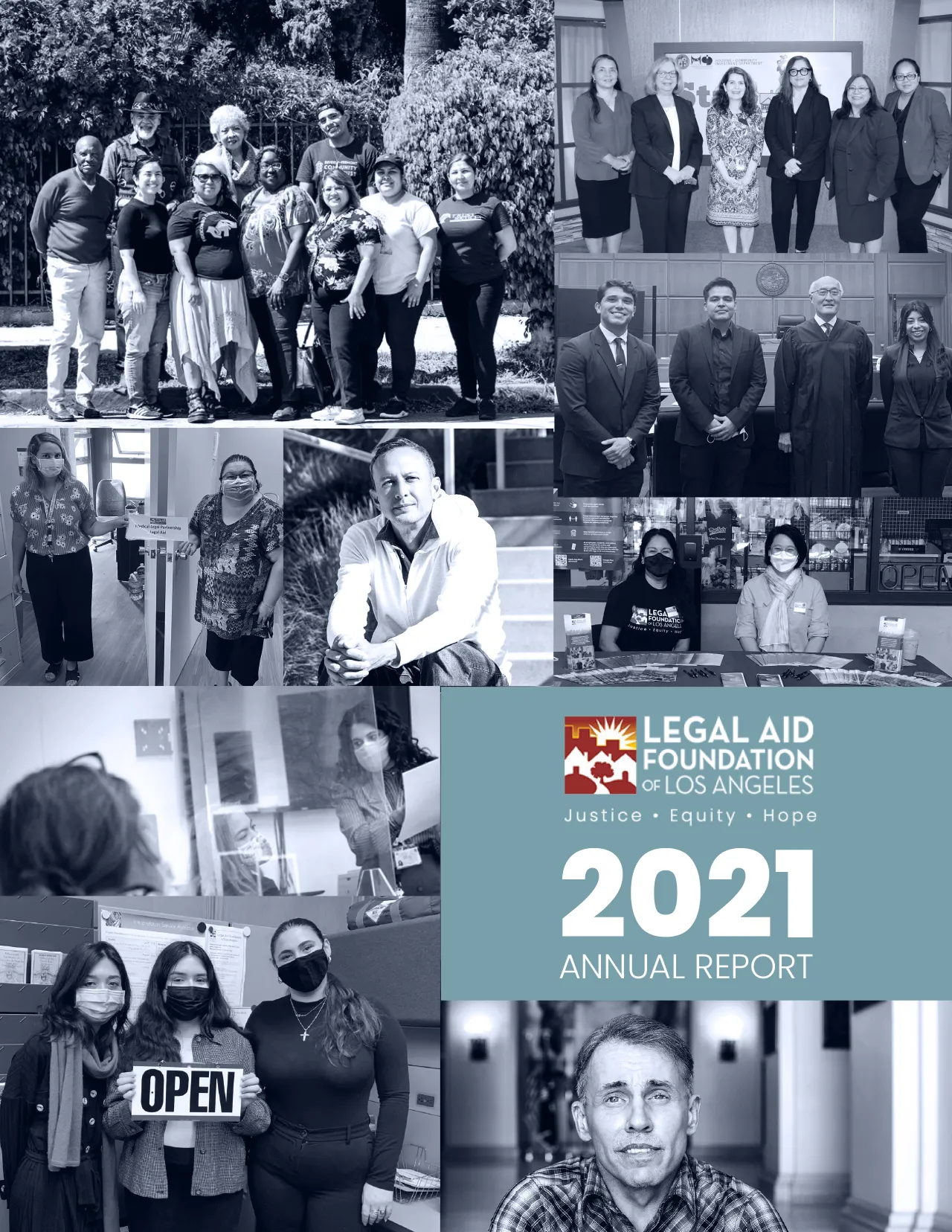
Dear Friends and Supporters,
The Legal Aid Foundation of Los Angeles has been a stalwart advocate for Angelenos living in poverty for more than 90 years. During the worst public health disaster in more than a century, we rose to the challenge of continuing to provide quality, free civil legal services to those in need. In doing so, the year 2021 proved to be a transformative moment for LAFLA: when we nimbly met the evolving needs of our communities, while staying true to our values and mission.

Silvia R. Argueta
Executive Director

Michael Maddigan
President, LAFLA Board 2020-2022
ACCOMPLISHMENTS
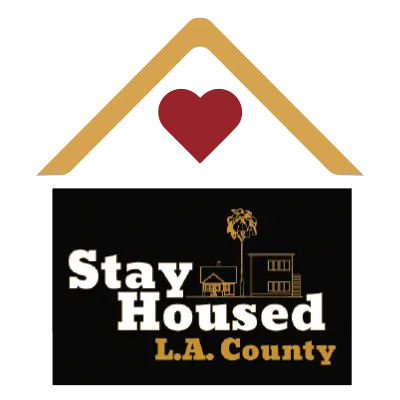
In its first full year, LAFLA continued to serve as the lead contractor for Stay Housed L.A., a City- and County-funded eviction prevention and defense program for low-income tenants. The partnership comprises 10 legal service providers and 15 community-based organizations. Specifically, LAFLA’s Eviction Defense Center staff represented tenants in eviction court, provided counsel and advice at clinics, and educated tenants about their rights. In 2021, Stay Housed L.A. reached out to 425,000 tenants, held 353 workshops and clinics with 9,299 attendees, and provided 5,084 tenant households with legal services.
LAFLA worked in close partnership with community partners on the passage of the Los Angeles City Tenant Anti-Harassment Ordinance (TAHO). The ordinance, which went into effect on August 6, 2021, applies to all residential units in the City of Los Angeles, and prohibits landlords from harassing tenants by doing certain acts, such as making threats of physical harm or removing housing services, or refusing to do certain acts, such as make repairs or accept rent payments.
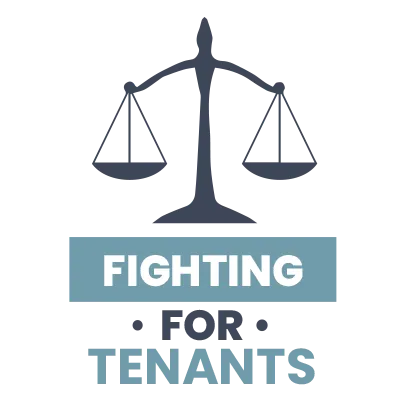
Starting November 1, 2021, landlords can sue tenants for rent that was deferred during the pandemic “protected period” spanning from March 2020 through September 2021 in small claims court. The Tenant Small Claims (TSC) Project assists tenants sued in small claims court with reviewing small claims court documents and assisting tenants to prepare defenses and evidence to present in the small claims hearing, where litigants must represent themselves. LAFLA’s TSC Project, in partnership with OneJustice, also has created training and clinic materials to help legal service providers replicate this small claims tenants assistance model throughout the state. The TSC Project also provides webinars for tenants to learn how to utilize small claims court to sue or countersue their landlord for violations of their tenants’ rights.
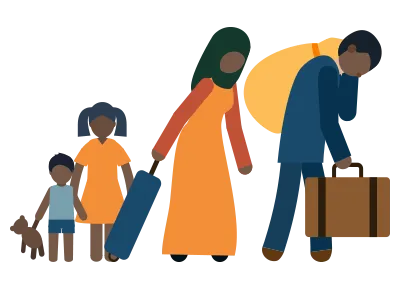
Given LAFLA’s experience working with refugees and those seeking asylum, the newly created Los Angeles County Afghan Refugee Taskforce invited LAFLA to participate in 2021. The County organized the taskforce in response to the Taliban takeover of Afghanistan, which caused tens of thousands of Afghans to flee — many of them to Southern California. As part of the taskforce, LAFLA has provided direct legal assistance to qualifying Afghan nationals and helped plan a pilot welcome center for Afghan nationals opening in 2022.
LAFLA partnered with the Fire Forestry Recruitment Program (FFRP) to assist those eligible for AB 2147, a form of relief that allows formerly incarcerated people who served their sentences through fire camp to apply for expungement. LAFLA has hosted pro bono clinics in partnership with FFRP and taken cases on an individual basis. The Los Angeles Times highlighted our work with FFRP twice in 2021, including an article in June entitled, “Why is it still so hard for former prisoners to become firefighters in California?”
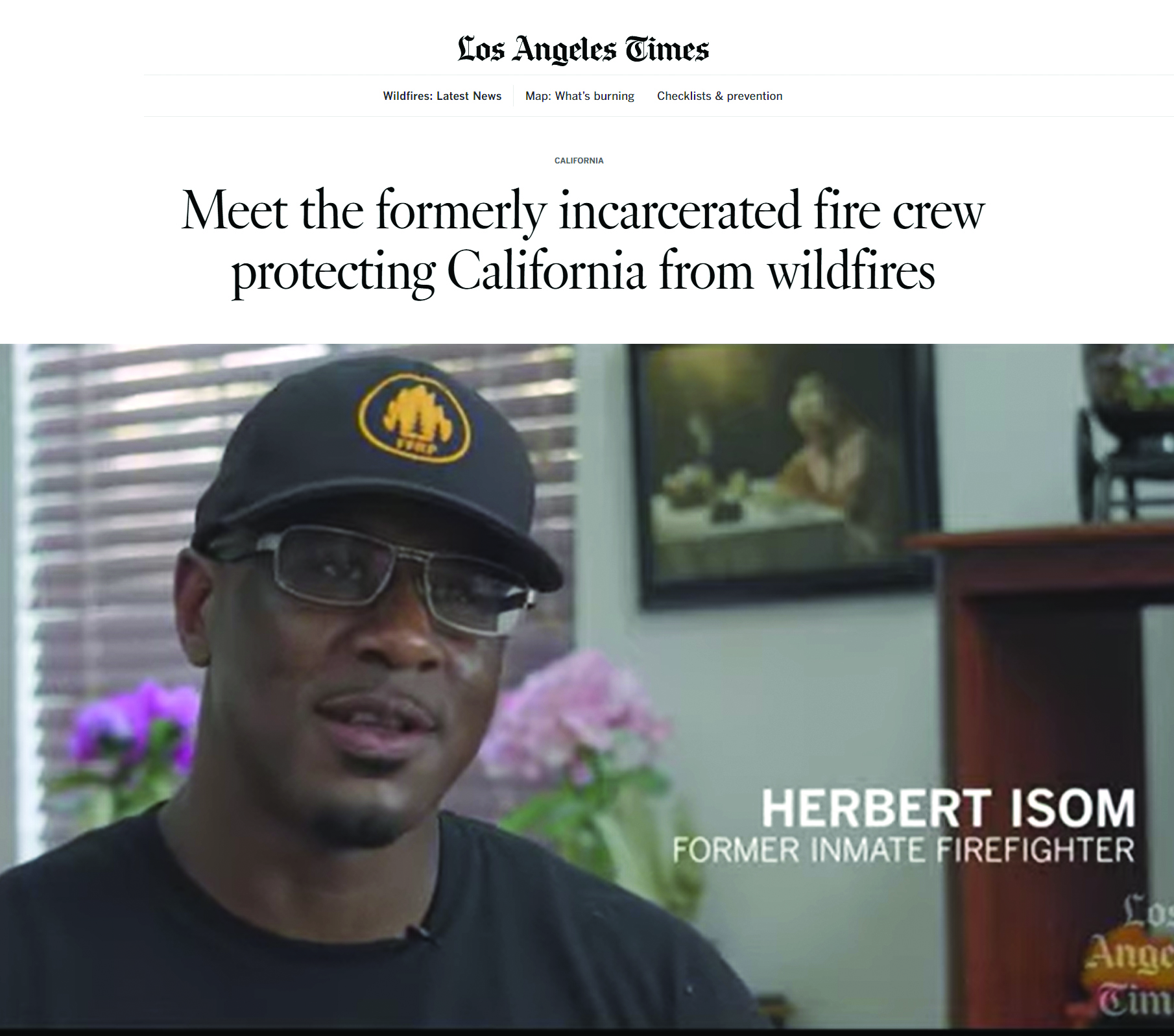
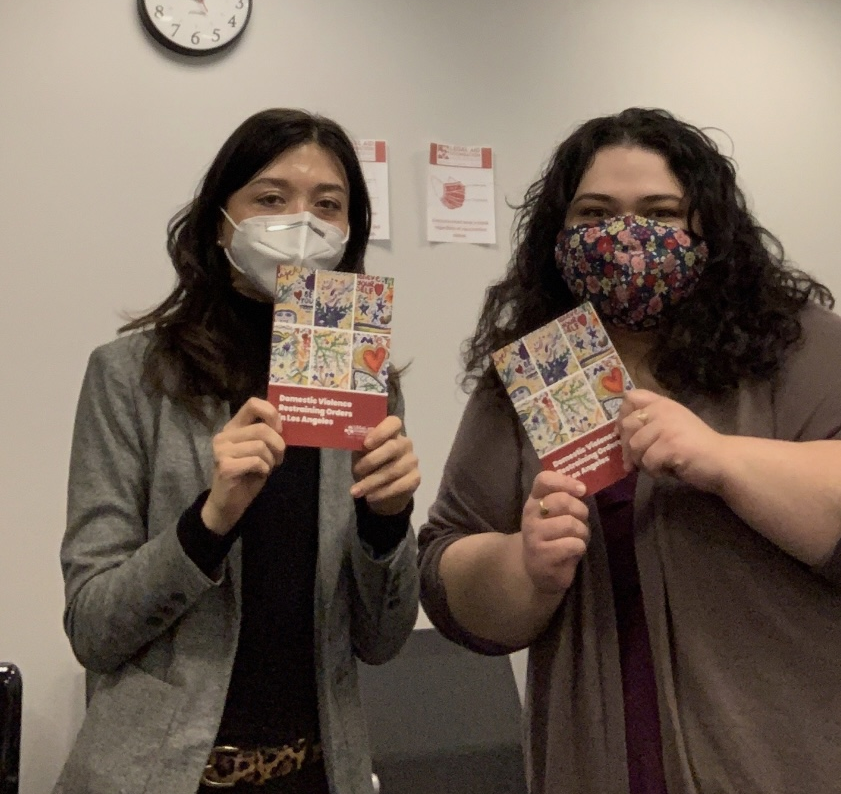
LAFLA continued to develop and provide the remote hearing studio for survivors to make virtual appearances for their domestic violence restraining order hearings. The remote hearing studio provides survivors who lack reliable technology or internet connections a safe, supportive, and private space in which to appear for restraining order hearings without having to face their abusers in person. Housed within a Family Justice Center where LAFLA works in collaboration with other advocacy organizations and agencies, the studio also offers survivors access to counseling, transportation, and other supportive services. In 2021, several of LAFLA’s clients appeared for their hearings, including a hearing with a witness, from the remote hearing studio. They noted that they felt safe, supported and warmly greeted by LAFLA and the Family Justice Center staff. LAFLA aims to continue growing the remote hearing studio to provide safe spaces for survivors, to bridge the digital divide, and to expand access to justice for clients.
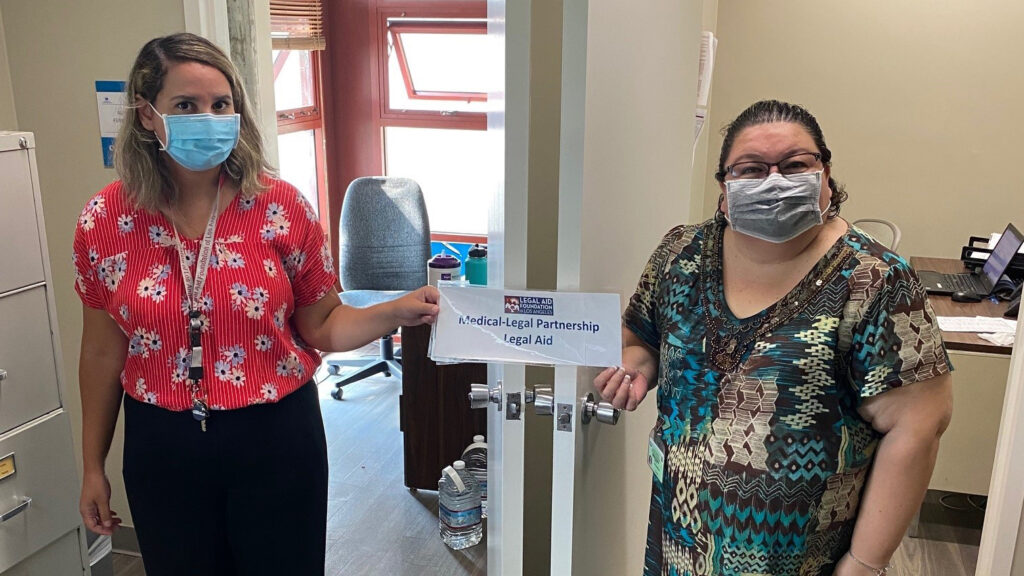
In 2021, LAFLA’s four medical-legal partnerships (MLPs) continued to navigate the challenges brought on by the COVID-19 pandemic, to ensure vulnerable patients had meaningful access to legal services. The Children’s Clinic MLP, which serves vulnerable patients in the greater Long Beach area, celebrated its 10th anniversary in 2021. Additionally, LAFLA’s three MLPs in the Medical-Legal Community Partnership (MCLP) — Martin Luther King, Jr. Outpatient Center, Coastal Health Centers, and Rancho Los Amigos National Rehabilitation Center — continued to serve L.A. County Department of Health Services patients remotely, pivoting to a hybrid service model once stay-at-home mandates lifted. The Rancho MLP team led all of the on-site MLP locations within the MCLP, which includes other legal service providers, in terms of the number of cases opened in 2021: more than 650. The Los Angeles Times and national Telemundo and Univision networks also profiled our MCLP clinics in their 2021 coverage.
A senior LAFLA attorney, who is a national expert in student loan matters, and a LAFLA client testified before a Congressional subcommittee regarding the Department’s refusal to grant automatic student loan discharges to students harmed by sudden school closures as well as the impact on low-income borrowers. After the testimony, the Department agreed to consider amending the regulations to allow automatic closed-school discharges in a negotiated rulemaking proceeding that was just starting. In the proceeding, the LAFLA attorney drafted a proposal, which the legal aid negotiators proposed and successfully convinced the Department to agree to, providing for mandatory closed-school discharges retroactively for borrowers whose schools closed after 1985. LAFLA is now waiting for the Department to publish proposed regulations.
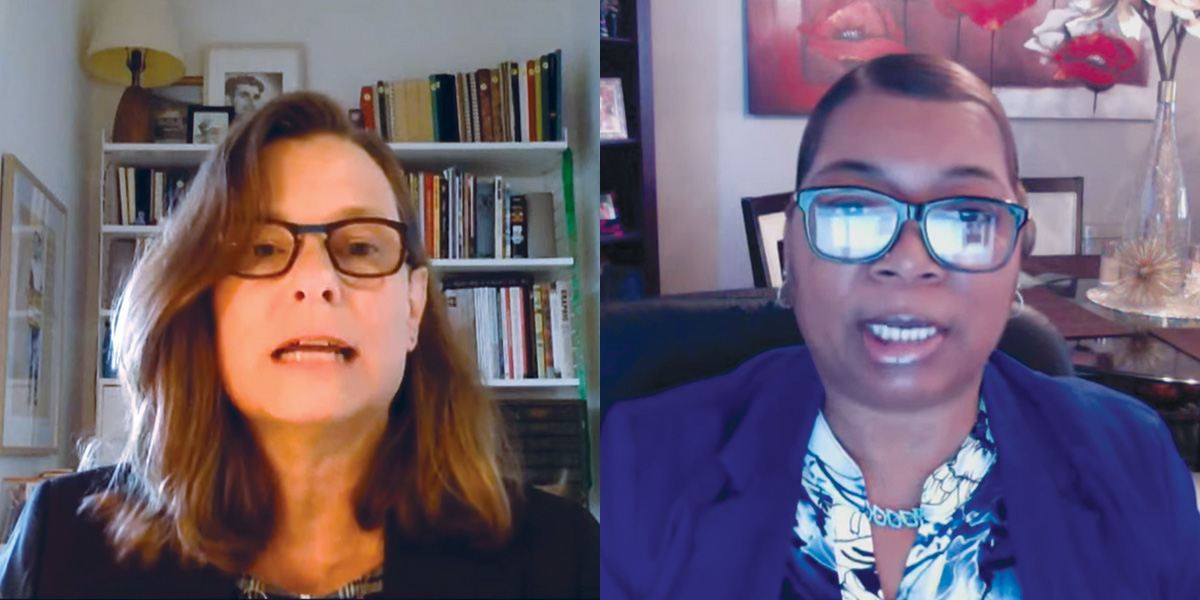
LAFLA reorganized its leadership team, adding several new director roles to address the changing needs of the organization. LAFLA created several new director positions, including the Director of Housing Justice and the Director of Community and Economic Justice. LAFLA also added a Director of Racial Justice and Equity role to guide the organization’s diversity, equity, and inclusion work alongside the Director of Human Resources, Diversity and Inclusion; and a Director of Client Access and Compliance role to oversee the ways in which LAFLA connects with clients and community members, as well as compliance matters.
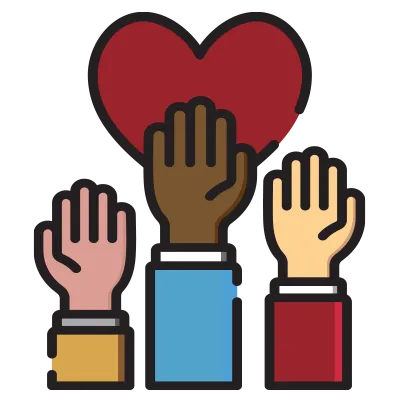
In 2021, LAFLA’s pro bono projects engaged more than 550 volunteers made up of attorneys, law students, undergraduate students, interpreters, community volunteers, and many others. These volunteers contributed more than 23,000 hours, valued at more than $10 million, to help expand LAFLA’s services to help meet the legal needs of the community. During the pandemic, pro bono volunteers went out of their way to represent tenants facing homelessness, domestic violence survivors trapped with their abusers, victims of crime seeking refuge in the U.S., previously incarcerated individuals hoping to clear their records, and many others. Also, LAFLA hosted numerous remote, volunteer-led legal clinics to serve the community as in-person clinics slowly opened. LAFLA is grateful to be able to call upon its many supportive pro bono partners during times of need.

LAFLA responded to gaps in social and legal services for speakers of languages other than English, which the pandemic revealed and exacerbated. In 2021, LAFLA and partner organizations engaged in extensive mediation with the California Department of Fair Employment and Housing (DFEH) and Employment Development Department (EDD), over the latter’s failure to provide adequate language access for individuals seeking unemployment benefits and resources (resulting in a settlement in early 2022). In 2021, LAFLA also filed a DFEH complaint over the California Department of Social Services’ (CDSS’) failure to provide meaningful language access in the administration of the Pandemic-EBT (food assistance) program tied to school closures. As a result, CDSS greatly improved its language access through expanded language lines and translations of its materials in the second round of P-EBT issuances.
LAFLA hosted its first-ever virtual symposium in February 2021, The Next 100 Years: Advancing Racial Justice & Empowering Communities. Through a series of panels, the symposium explored the intersection of racial justice and LAFLA’s work across the spectrum of public interest law. The event brought together members of the legal community and social justice advocates to participate in critical conversations about some of the most pressing issues impacting underserved communities – particularly in the wake of the pandemic and the nation’s reckoning with systemic racism. The panels were: Racial Justice and the Delivery of Legal Services; Housing Justice is Racial Justice; and Health, Race, and the Way Forward.
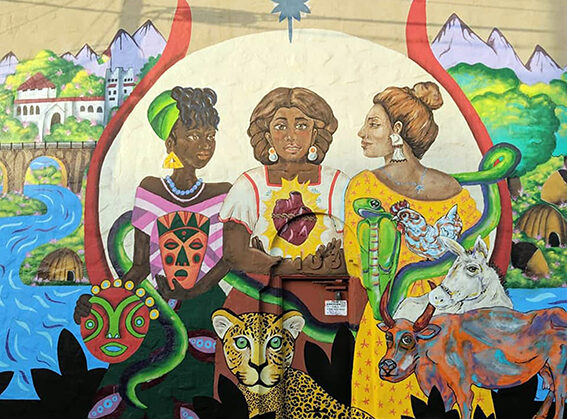
SERVICES
ASIAN & PACIFIC ISLANDER (API) COMMUNITY OUTREACH PROJECT:
Provides linguistically accessible, culturally intelligent, trauma-informed help to API clients in their preferred language, with access to all LAFLA services.
ECONOMIC STABILITY WORKGROUP:
Government Benefits — Helps people obtain benefits to fulfill basic needs (food, shelter, medical care, and services to attain self-sufficiency). Employment — Fights wage theft and denial of unemployment insurance benefits. Advises on wrongful terminations and discriminatory employment practices. Student Loans — Helps people who cannot afford to repay their student loans due to disability or who have attended for-profit colleges that engaged in predatory, deceptive, or illegal practices.
EVICTION DEFENSE CENTER:
Provides housing rights information and direct representation for individuals facing eviction. Prevents housing-subsidy residents and Section 8 voucher holders from losing their housing and/or subsidies. Preserves Rent Stabilized Ordinance (RSO) tenancies and prevents RSO violations. Helps clients living in uninhabitable conditions get repairs or reductions in rent. Provides eviction defense resources to tenants through Stay Housed L.A. partnership.
HOUSING AND COMMUNITIES WORKGROUP:
Engages a movement-lawyering approach to prevent unfair displacement and preserve and expand affordable housing. Deploys legal strategies in partnership with the community to defend the rights of unhoused individuals and families and provide legal support to community-based organizations seeking to build healthy, economically vibrant communities.
MEDICAL-LEGAL PARTNERSHIPS:
Provides patients with access to legal services — focusing on those that can negatively impact the health of patients, such as poor housing conditions, loss or denial of public benefits, and violence within the home.
PREVENTING AND ENDING HOMELESSNESS PROGRAM:
Provides legal services to households facing homelessness and/or imminent eviction, as well as unhoused individuals and families, in the South Bay/ Harbor area and southeast Los Angeles County.
RESTORING COMMUNITIES WORKGROUP:
Provides legal assistance to reentry for individuals in various substantive areas including but not limited to housing, benefits, and record clearing. Removes barriers to reentry and housing and housing stability, so people can have a fresh start and better access to work and housing opportunities.
SANTA MONICA COMMUNITY PARTNERSHIP:
Provides legal services to the Santa Monica client community in the areas of housing and homelessness, tenant harassment, domestic violence, family law, and public benefits. Tenant Small Claims Project — Provides resources and support to tenants sued in small claims court for COVID-19 rental debt, including workshops and seminars. Assists tenants in suing their landlords in small claims court for violation of their tenants’ rights. Represents some tenants in small claims court appeals.
SELF-HELP LEGAL ACCESS CENTERS:
Assists individuals who represent themselves (regardless of income or immigration status). Offers legal information, help with preparing court forms, and guidance on a variety of civil legal matters. Provides referrals to private attorneys or legal services programs as needed.
SUPPORTING FAMILIES WORKGROUP:
Domestic Violence — Helps and represents survivors of domestic violence and sexual assault in obtaining restraining orders, and orders for custody, dissolution, visitation, and support. Immigration — Assists and represents survivors of domestic violence, torture, human trafficking, and other serious abuse in removal proceedings and before U.S. Citizenship & Immigration Services (USCIS). Helps and represents individuals before USCIS to become U.S. citizens. Torture Survivors Project — Provides legal assistance, representation, and community education to immigrants who are survivors of torture.
VETERANS JUSTICE CENTER:
Advocates on behalf of veterans to obtain life-sustaining income, health, and housing benefits. Dismisses tickets and expunges convictions so veterans can have a fresh start. Upgrades unjust less-than-honorable military discharges. Prevents veteran homelessness.
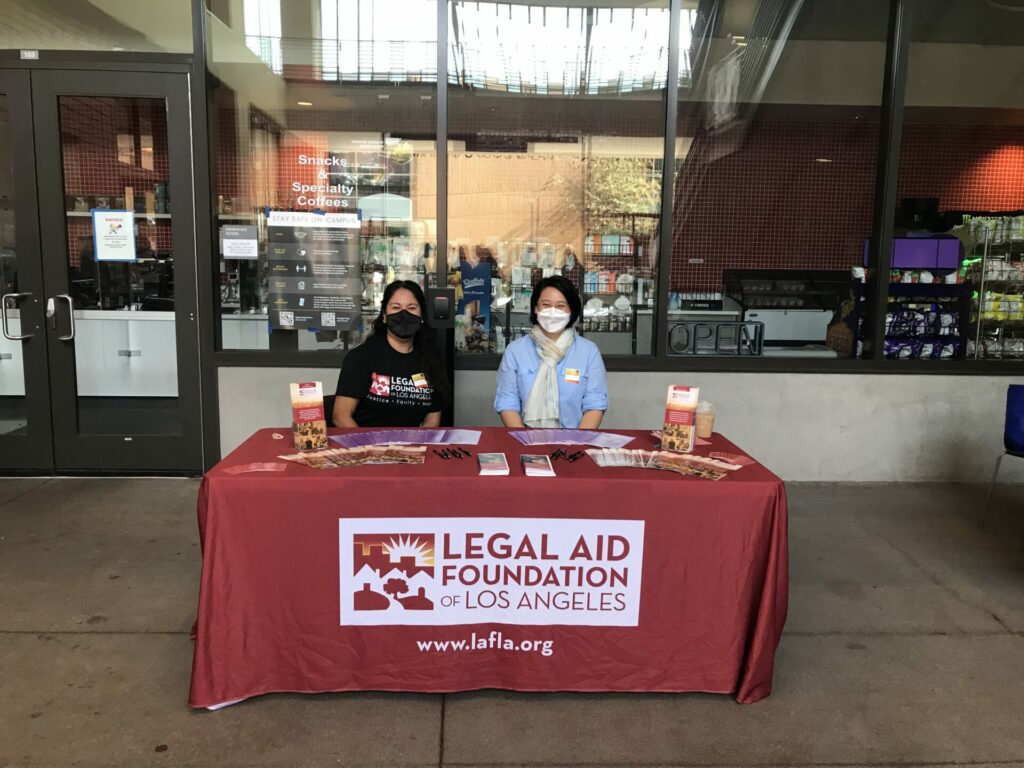
2021 IMPACT

service donated
LA County residents received legal help through LAFLA.



Clients
speak
29+
languages
23% of clients
have limited
English
proficiency

American Sign Language, Amharic, Arabic, Armenian, Bengali, Cantonese, English, Farsi, French, Hebrew, Hindi, Italian, Japanese, Khmer (Cambodian), Korean, Mandarin, Mongolian, Polish, Portuguese, Russian, Spanish, Tagalog, Thai, Tigrinya, Urdu, Vietnamese, Zapotec
through self-help
legal access centers
Who We Help
By Race/Ethnicity*
By Age*
By Gender*
By Legal Issue*
* This information is based on our clients with cases open in 2021.
Client VICTORIES
Unhoused Veteran Outed During Service Receives Full Benefits and Backpay from VA
Fighting Gentrification Through New Models of Homeownership
LAFLA Helps Student Victimized by For-Profit School Clear Debt
Financials
Revenue & Support
Expenses
DONATED SERVICES
Thank You
Allison Faith Charitable Fund through Schwab Charitable
Andrues/Podberesky, APLC
Ballard Spahr Andrews & Ingersoll, LLP
Bartholomew Aguayo Family Fund
Benevity OneWorld
California Community Foundation
Charities Aid Foundation of America
Christ-Centered Ministries
Coit Family Foundation
Crowell & Moring LLP
Dweck Charitable Fund, Inc.
Giving Foundation, Inc.
Holland & Knight LLP
IBM Employee Services Center
Innovative Artists
JP Morgan Chase Foundation
Kirkland & Ellis LLP Foundation
L.A. Care Health Plan
Law Office of Beatrix Whipple
Law Office of Razmin Monghate
Liberty Hill Foundation
Lucky Seven Foundation
Manufacturers Bank
Morgan, Lewis & Bockius LLP
NantMedia Holdings, LLC
National Consumer Law Center, Unc.
Neighborhood Legal Services of Los Angeles County
Nossaman LLP
R.J. and D.A. Munzer Foundation
Religious of the Sacred Heart of Mary
Riot Games, Inc.
S. Mark Taper Foundation
Sarah Carpenter and Robert Newman Family Foundation
Sheldon & Carol Appel Family Foundation
Susman Godfrey L.L.P.
Thai Community Development Center
The Blackbaud Giving Fund
The Eli & Edythe Broad Foundation
The Elks of Los Angeles Foundation/Los Angeles Lee Linden Foundation
The Fitzgerald Family
The Hirsch Family
The Lever Family Foundation
U.S. Charitable Gift Trust
University of California, Los Angeles
Venable Foundation, Inc.
Vision Management Services
WilmerHale
ANGEL
Munger, Tolles & Olson
GUARDIAN ANGEL
Morgan Lewis
GUARDIAN
Cheryl & Haim Saban and the Saban Family Foundation
Kirkland & Ellis
Latham & Watkins
O’Melveny
Orrick
Sheppard Mullin
Skadden
GUARDIAN ADVOCATE
Quinn Emanuel
ADVOCATE
City National Bank
Covington & Burling LLP
Fox Corp.
Gibson Dunn
Loeb & Loeb
TM Financial
PATRON
AT&T
Debra Fischer & Sherwin Frey
Edison
Foley & Lardner
Hogan Lovells
Jenner & Block
Manatt
Mayer Brown
Northrop Grumman
Pasich
Proskauer
Seth & Valerie Aronson
Sidley
Sullivan & Cromwell
Susman Godfrey
Willkie Farr & Gallagher
PARTNER
Epic Brokers
Glaser Weil
Greenberg Glusker
IOA Insurance Services
Jim & Elizabeth Burgess
Jim Hornstein & Victoria Diamantidis
Jones Day
KPMG
Martin & Karen Tachiki
Matthew & Tristan Close
McGuireWoods LLP
Morrison & Foerster
Nossaman
Polsinelli
Reed Smith
Rita Tuzon & Rick Stone
Seyfarth
Sony Pictures Entertainment
Spertus, Landes & Umhofer
TELACU
TSG Reporting Inc.
PRESIDENT
Michael Maddigan
VICE PRESIDENT
Amy Lerner Hill
SECRETARY
Amber S. Finch
TREASURER
R. Alexander Pilmer
COMMUNITY COMMITTEE CHAIR
C. Cleo Ray
COMMUNITY COMMITTEE VICE CHAIR
Patricia Vining
BOARD OF DIRECTORS
Karen J. Adelseck
Eric Bakewell
James M. Burgess
Wendy R. Cabil
Kyle Casazza
Sean A. Commons
Phyllis Coto
Carissa Coze
E. Martin Estrada
Joseph B. Farrell
Marc Feinstein
Debra L. Fischer
Felix Garcia
Naomi Haywood
Silvia Hernandez
James E. Hornstein
Robert Hubbell
Lynette M. Jones
Kimberly Klinsport
Zella Knight
Jason Linder
Clementina Lopez
John Maldonado
Louise Mbella
Virginia F. Milstead
Kevin J. Minnick
Phillip Mobley
Fanny Ortiz
Adam S. Paris
Joseph Paunovich
Craig O. Roberts
David Lewis Sagal
Kareen Sandoval
Kahn A. Scolnick
Marc M. Seltzer
Linus Shentu
Jeff A. Taylor
Ronald B. Turovsky
Brianne Wiese
Liat Yamini
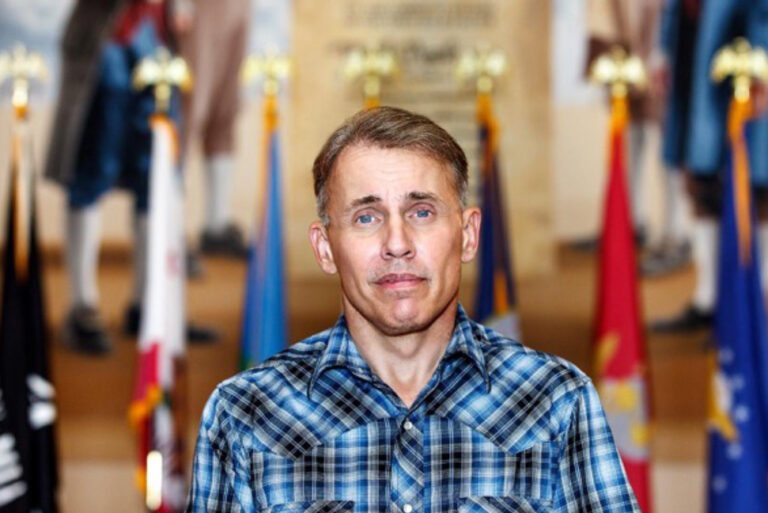
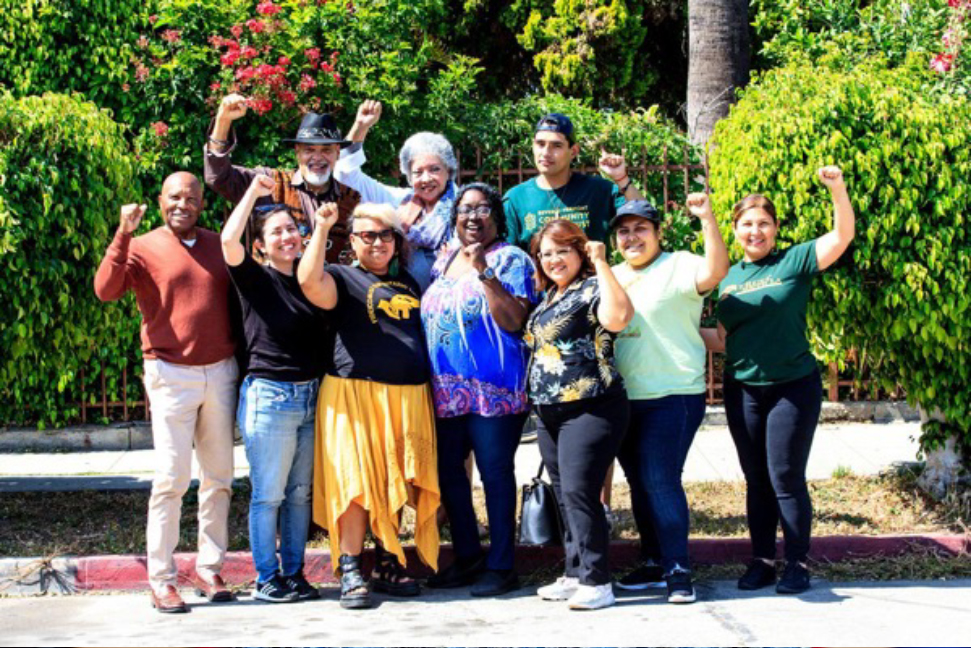



 Charles proudly served as a firefighter in the Air Force, largely to honor his father who was also a veteran: “He was my hero. I was following my family tradition in the military and was ahead of schedule with my goals. It was the last time I was happy in life.”
Charles proudly served as a firefighter in the Air Force, largely to honor his father who was also a veteran: “He was my hero. I was following my family tradition in the military and was ahead of schedule with my goals. It was the last time I was happy in life.”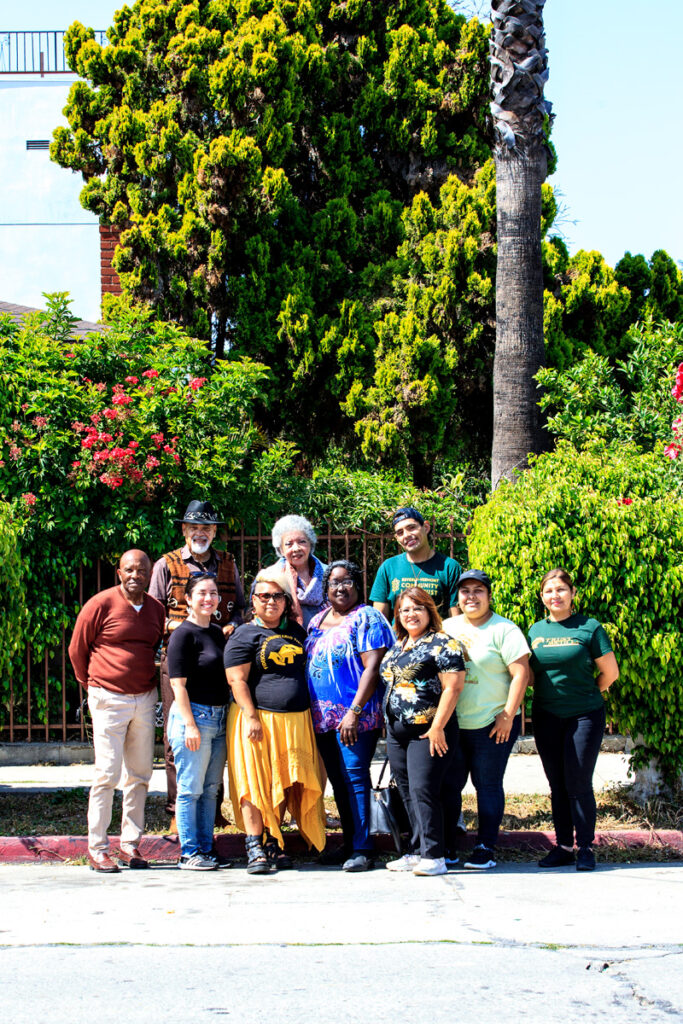 Zerita’s activism grew from a desire to stand up for members of the community where she has lived most of her life. “Over 30 years, my parents, my children, and I have all faced evictions even though we have always paid our rent – at four different properties, all within the same neighborhood. I realized what was going on was not coincidental.”
Zerita’s activism grew from a desire to stand up for members of the community where she has lived most of her life. “Over 30 years, my parents, my children, and I have all faced evictions even though we have always paid our rent – at four different properties, all within the same neighborhood. I realized what was going on was not coincidental.”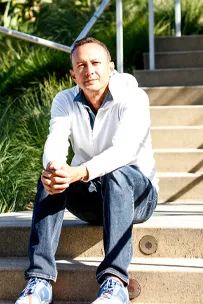 Ramon was excited to finally pursue his dream of working in Hollywood: “I always had a camera in my hand ever since I was a kid.” He learned about a for- profit school that claimed to provide training for film careers. Before he enrolled, the school assured him that Federal Pell Grants and GI Bill funds (he is a veteran) would cover the entire cost of his program, and he would not need to take out any student loans.
Ramon was excited to finally pursue his dream of working in Hollywood: “I always had a camera in my hand ever since I was a kid.” He learned about a for- profit school that claimed to provide training for film careers. Before he enrolled, the school assured him that Federal Pell Grants and GI Bill funds (he is a veteran) would cover the entire cost of his program, and he would not need to take out any student loans.